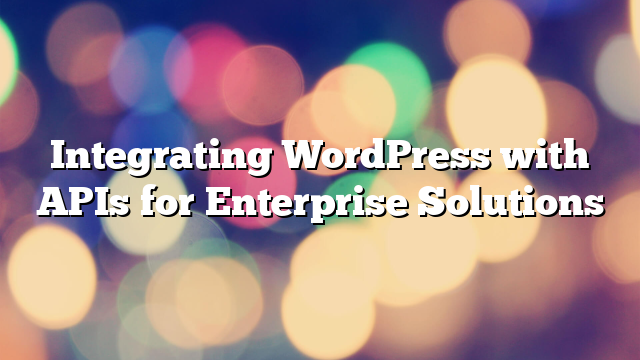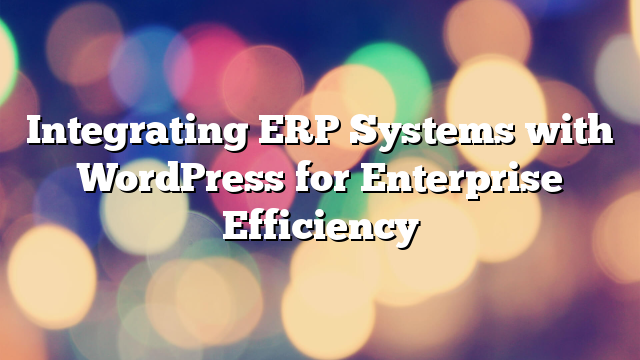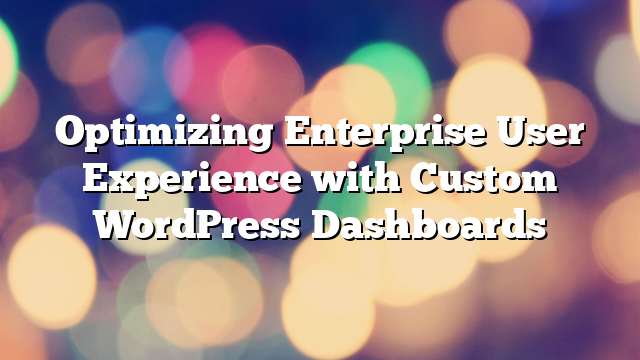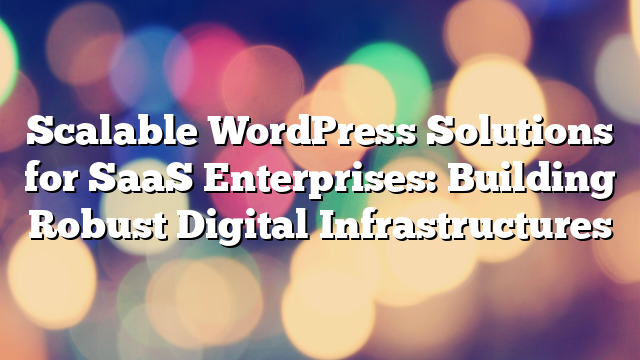Integrating WordPress with APIs for Enterprise Solutions
09.11.2024

In today’s digital landscape, APIs (Application Programming Interfaces) have become a vital tool for businesses looking to integrate different systems, streamline workflows, and enhance the functionality of their websites. For enterprises using WordPress, API integration offers a way to extend the platform’s capabilities beyond its core features. This article explores how WordPress can be integrated with APIs to create powerful, scalable enterprise solutions and how businesses can leverage this integration to improve user experience, data management, and system performance.
What is API Integration?
API integration refers to the process of connecting different software systems and applications through APIs, allowing them to communicate and share data. In the context of WordPress, API integration allows the platform to interact with third-party systems, such as CRMs, ERPs, payment gateways, and marketing tools. This enables WordPress websites to offer a range of dynamic features that go beyond the default capabilities of the platform.
For enterprises, API integration is an essential way to link various services and automate processes, ensuring that systems can work together seamlessly. Whether you’re building an e-commerce platform, a customer portal, or a data-driven application, API integration can significantly enhance the functionality of your WordPress site.
Benefits of API Integration for WordPress in Enterprise Environments
1. Streamlined Data Management
Enterprises often rely on multiple software solutions to manage different aspects of their business, from customer relationships and inventory to accounting and marketing. By integrating WordPress with APIs, businesses can synchronize data between WordPress and other systems, ensuring that all platforms have up-to-date information. For example, integrating WordPress with a CRM system allows businesses to manage customer data in real-time, automate communication, and provide personalized experiences to users.
API integration eliminates the need for manual data entry, reducing the chances of errors and improving overall efficiency. Enterprises can ensure that customer data, orders, and other critical information are automatically updated across systems, enabling more effective decision-making and smoother operations.
2. Enhanced User Experience
API integration can significantly enhance the user experience by allowing WordPress to provide real-time content, personalized recommendations, and dynamic features. For example, integrating WordPress with a third-party recommendation engine API allows businesses to offer personalized product recommendations based on user behavior, improving customer engagement and increasing sales.
Similarly, API integration with social media platforms enables users to log in with their existing accounts, share content, or interact with products directly from the WordPress site. This creates a more seamless and personalized experience, encouraging users to spend more time on the site and increasing conversion rates.
3. Automating Workflows
In enterprise environments, automation is key to improving efficiency and reducing manual workload. API integration can automate many tasks that would otherwise require human intervention. For example, integrating WordPress with an email marketing platform allows businesses to automatically add new users to email lists, send out welcome emails, and schedule marketing campaigns—all without manual input. Similarly, integrating WordPress with an inventory management system ensures that stock levels are automatically updated whenever a product is purchased.
Automating these workflows frees up valuable time for employees, allowing them to focus on more strategic tasks while ensuring that business processes run smoothly and without delays.
4. Improved Security
Security is a major concern for enterprises, especially when dealing with sensitive customer data and financial transactions. API integration can enhance security by allowing enterprises to use specialized, secure systems for critical processes, such as payment processing or authentication, while keeping the core WordPress site protected. For instance, integrating WordPress with a secure payment gateway like Stripe or PayPal allows businesses to handle financial transactions without compromising the security of their website.
Furthermore, API integrations with identity verification tools, such as multi-factor authentication systems, can help improve user login security, reducing the risk of unauthorized access to sensitive business data.
Common API Integrations for WordPress Enterprise Websites
1. CRM Systems
Customer Relationship Management (CRM) systems are essential for businesses that need to manage customer interactions, track sales leads, and improve customer service. By integrating WordPress with a CRM system via an API, enterprises can streamline the process of capturing and managing customer data. APIs enable automatic synchronization of contact information, interaction history, and other details, ensuring that the CRM is always up-to-date with the latest customer interactions.
Popular CRM systems such as Salesforce, HubSpot, and Zoho offer APIs that can be integrated with WordPress to provide a seamless flow of information between the website and the CRM, improving lead tracking, customer segmentation, and sales automation.
2. Payment Gateways
For e-commerce websites, integrating WordPress with payment gateways via APIs is crucial for processing transactions securely and efficiently. Payment gateway APIs allow enterprises to accept payments through multiple methods, including credit cards, PayPal, and mobile wallets. Integrating these APIs with WordPress ensures that payments are processed seamlessly, reducing cart abandonment rates and increasing conversion rates.
Additionally, payment gateway APIs offer features like fraud detection, currency conversion, and automated invoicing, providing added convenience for both businesses and customers.
3. Marketing Platforms
Marketing automation tools help enterprises improve customer engagement, track leads, and optimize campaigns. By integrating WordPress with marketing platforms like Mailchimp, ActiveCampaign, or Marketo, businesses can automate email marketing campaigns, segment their audience, and track performance metrics. APIs allow WordPress to send user data, such as email addresses or browsing behavior, to marketing platforms for more targeted and personalized campaigns.
Automating marketing workflows via API integration ensures that businesses can deliver timely and relevant content to their customers without manual intervention, improving customer retention and overall ROI.
4. ERP Systems
Enterprise Resource Planning (ERP) systems are used by large businesses to manage core business functions, such as accounting, inventory, and human resources. Integrating WordPress with ERP systems via APIs enables businesses to synchronize data across platforms, ensuring consistency and reducing errors. For example, API integration can allow an e-commerce store to automatically update stock levels and prices based on data from the ERP system, improving accuracy and efficiency.
By connecting WordPress to ERP systems, enterprises can streamline operations and ensure that all aspects of the business are working with the same up-to-date information.
How to Implement API Integration in WordPress
1. Choose the Right API
The first step in integrating an API with WordPress is selecting the right API for your needs. Consider what functionality you want to add to your website and whether the API provider offers the necessary endpoints and security features. Look for APIs that offer good documentation and support to ensure a smooth integration process.
2. Use WordPress Plugins for Easy Integration
If you’re not familiar with coding or prefer a faster solution, you can use WordPress plugins to integrate APIs. Many popular services, such as Mailchimp, HubSpot, and Stripe, offer pre-built plugins that make the integration process much easier. These plugins typically handle the API calls and ensure that the data flows between WordPress and the external service without requiring custom development.
3. Develop Custom API Integrations
For more complex integrations, you may need to develop custom API connections. WordPress provides several functions, such as `wp_remote_get()` and `wp_remote_post()`, that allow you to make API requests and handle responses within your WordPress site. Developers can also create custom API endpoints in WordPress to expose specific data or trigger actions based on external requests.
4. Test and Monitor the Integration
Once the API integration is in place, it’s important to thoroughly test the system to ensure that it works as expected. Monitor API calls for errors and performance issues, and be sure to handle edge cases such as timeouts or invalid data. Regular monitoring will help maintain the reliability of your integration and ensure that it continues to function smoothly over time.
Conclusion
API integration is a powerful tool for enterprises looking to extend the capabilities of their WordPress sites. By integrating with CRMs, payment gateways, marketing platforms, and ERP systems, businesses can streamline operations, improve user experience, and enhance functionality. With the right APIs and a well-executed integration strategy, enterprises can unlock the full potential of WordPress and build dynamic, scalable websites that meet the complex needs of modern businesses.
To get started with API integration for your WordPress site, contact AllWebDev and explore how we can help you implement seamless API integrations to optimize your enterprise solutions.



